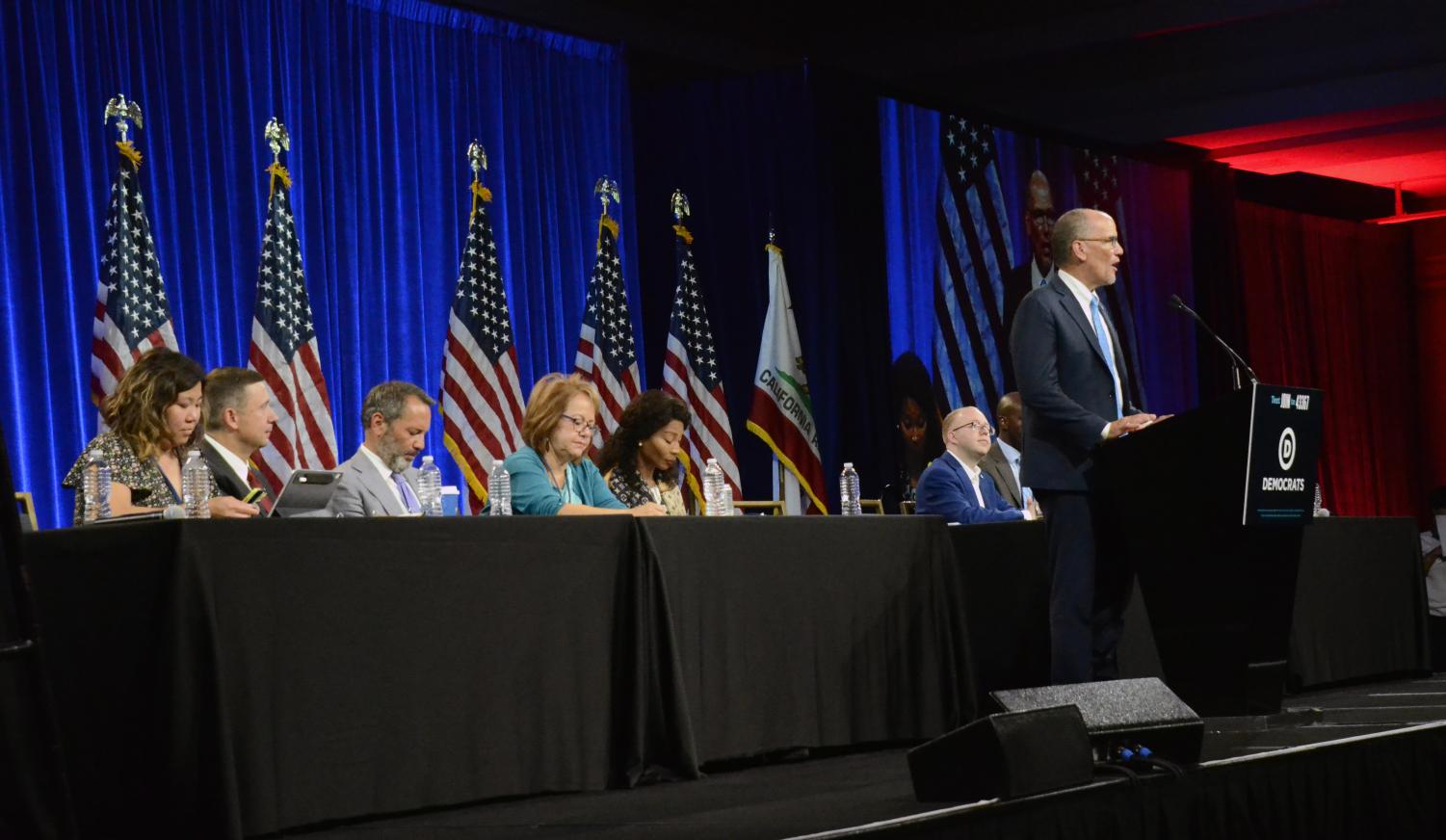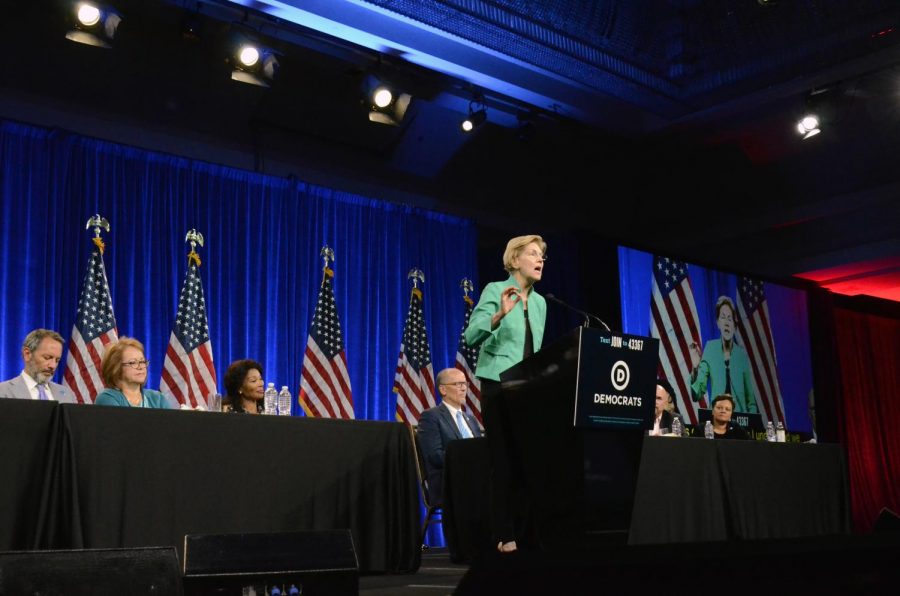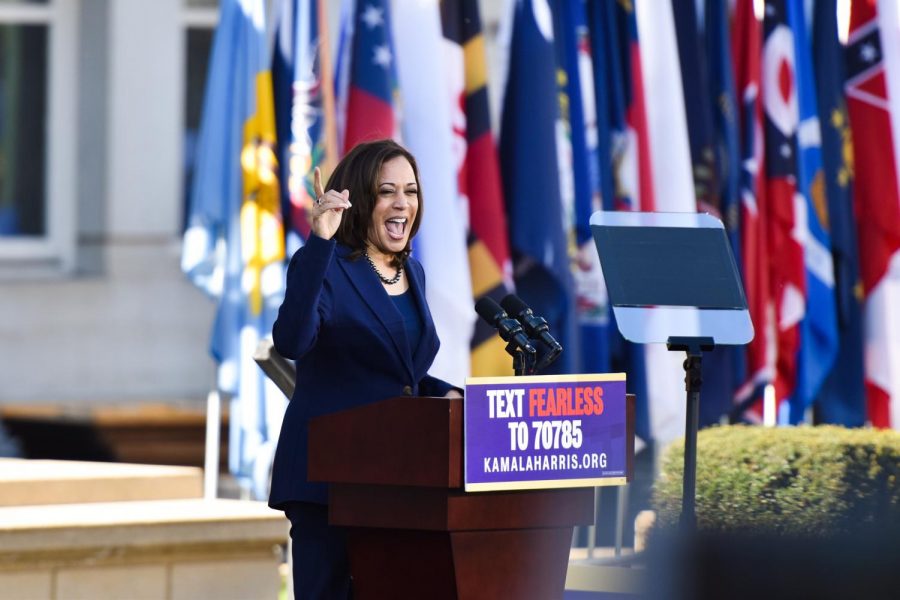Presidential candidates, climate protesters and DNC members convene at summer meeting in San Francisco
Hearing the perspective of protesters, high schoolers and presidential candidates at the event
August 26, 2019
Outside the Hilton San Francisco Union Square Hotel on Friday, supporters of presidential candidate Tom Steyer cheered and waved blue “Tom 2020” posters. Dispersed throughout the lobby, people of all ages wearing “Kamala Harris for the People” shirts handed out flyers. An older man in an American flag hat wore a neon green cardboard sign bearing the words “Lock Him Up,” referencing President Donald Trump, slung over his shoulders.
The hotel buzzed with activity this Thursday, Friday and Saturday as several hundred Democratic National Committee (DNC) members gathered to participate in caucus and committee meetings on topics ranging from the DNC budget to Native American rights. As this meeting was the last one before the Democratic primary in February and March 2020, members also strategized for the 2020 election and listened to presidential candidates deliver eight-minute speeches on Friday.
The 13 presidential candidates present at the meeting were Sens. Michael Bennet (D-Colo.), Cory Booker (D-N.J.), Kamala Harris (D-Calif.), Amy Klobuchar (D-Minn.), Bernie Sanders (D-Vt.) and Elizabeth Warren (D-Mass.); former Secretary of Housing and Urban Development Julián Castro; author Marianne Williamson; entrepreneur Andrew Yang; hedge fund manager Tom Steyer; Reps. Seth Moulton (D-Mass.) and Tim Ryan (D-Ohio) and former Pennsylvania Rep. Joe Sestak.
The current top-polling candidate, former vice president Joe Biden did not attend the meeting. Instead, he and other absent candidates sent videos. Currently, Biden polls at an average of 28.8 percent, according to RealClearPolitics.com. Sanders and Warren follow Biden with 16 and 15.4 percent respectively, and Harris and Buttigieg poll at 7.4 and 5 percent respectively.
DNC members have a smaller role in the 2020 primary compared to the 2016 primary. At the 2020 DNC national convention, superdelegates will only cast votes for a party nomination if no candidate wins a majority of delegates from primaries and caucuses.
Climate change took center stage at the meeting as a youth-led political group, the Sunrise Movement, organized demonstrations throughout the event in committee meetings, hallways and outside the hotel. The protesters called for the DNC to allow for an additional Democratic presidential debate that specifically focuses on climate-related issues.
On Friday, Sunrise Movement members in bright yellow shirts protested outside of the hotel, carrying yellow posters with words like “Be Brave,” “Climate Debate” and “Our Future is Not a Single Issue.” At times, they sang protest songs like “Which Side Are You On?” in unison.
“The biggest obstacle [to a climate debate] is the whole way that the debate system works right now. It’s not listening to the people in the same way that it should be,” Carmen Bouquin, an organizer in the Sunrise Movement, said in an interview with Harker Aquila.
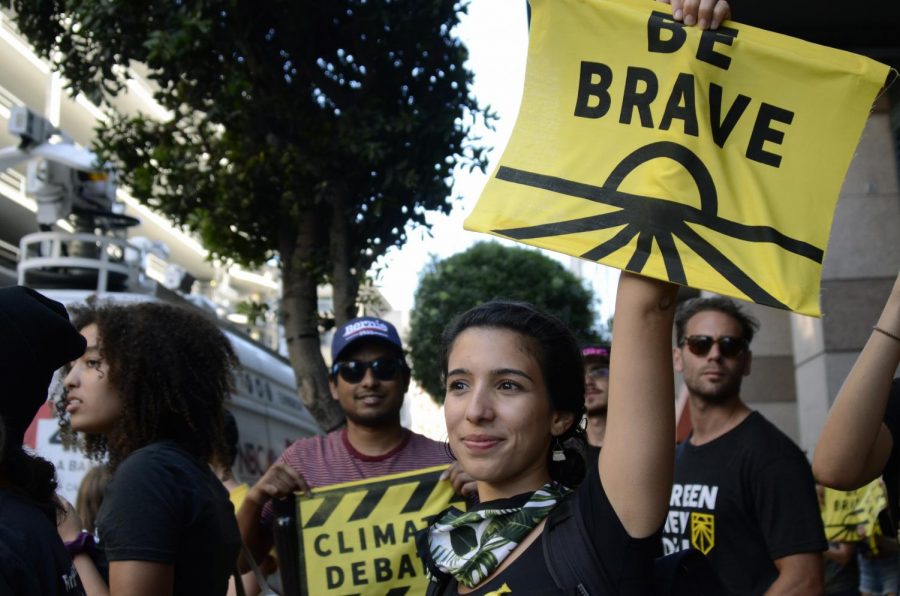
A protester from the Sunrise Movement holds up a bright yellow sign bearing the words “Be Brave” outside the Hilton San Francisco Union Square hotel. The protesters called on DNC members to allow for a Democratic presidential debate focused on climate-related issues. DNC members voted down resolutions that would allow for such a debate on Thursday and Saturday.
Frontrunners Joe Biden, Bernie Sanders, Elizabeth Warren and Kamala Harris have all spoken out in support of a climate debate. Steyer, who entered the race on July 9, also supports immediate executive action on climate change.
“My appeal to young people is I’m completely direct, in particular on the issue that they care the most about, which is climate,” Steyer said in an interview with Harker Aquila. “I said on day one I would declare a state of emergency on climate because in fact if we don’t start on day one, if we wait for the votes to come in through Congress, we will miss the window to keep control of the situation.”
Candidates Ryan and Yang spoke to Sunrise Movement members during one of their demonstrations, echoing their calls for a climate debate. On Saturday, Ryan released a statement proposing that the debate be held in his home state of Ohio in order to directly address industrial belt communities.
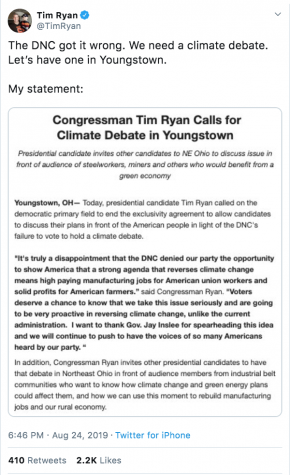
While CNN will host individual town halls on climate change for 10 of the candidates on Sept. 4, a climate debate would allow candidates to respond to each other’s platforms.
In a June statement, DNC chairman Tom Perez warned that allowing a climate debate would open the door to requests for other single-issue debates, which the DNC could not all honor. In a 17-8 vote on Thursday, the DNC’s Resolutions Committee voted down a resolution for a climate debate. In a 222-137 vote on Saturday, DNC members also voted down a resolution that would allow debates between the candidates on single issues, like climate change.
Candidates also took the opportunity to discuss their recent proposals at the meeting. Castro, who qualified for the third round of Democratic debates on Tuesday, spoke to Harker Aquila about his People First Housing plan, which he released on June 17.
His plan calls for greater investment in affordable housing and tools to counter gentrification in areas like San Francisco. He believes that “smart rent control,” such as that which exists in San Francisco, could benefit other cities as well.
“We need to create more affordable housing in neighborhoods that we’ve oftentimes not invested in and then also neighborhoods of so-called higher opportunity, so that people have a choice of where to live,” Castro said in an interview with Harker Aquila. “When I was Housing Secretary, we worked with San Francisco to make sure that we could accommodate the needs of the local community as much as possible so that people who are living here can stay here.”
High school students from across the Bay Area also played prominent roles in the DNC meeting. Haritha Kumar, vice chairwoman of High School Democrats of America (HSDA), and Jack Greenspan, chair of HSDA, came to the meeting to promote an amendment to the DNC Charter and Bylaws. The amendment gives HSDA two seats on the DNC.
“Youth have such a big stake in the issues of 2020 and beyond,” Jack, who is a senior at Scarsdale High School in New York, said in an interview with Harker Aquila. “We want to have a seat at the table so we can make our voices heard on those important issues.”
On Friday, Haritha, who is a senior at Cupertino High School, told Harker Aquila that the responses from DNC members to the amendment were “overwhelmingly positive.” On Saturday, the DNC passed the amendment.
California Democrats will vote in the primary on “Super Tuesday” on March 3, 2020 along with 11 other states, after voters in Iowa, New Hampshire, South Carolina and Nevada cast their ballots.
2020 presidential candidate Kamala Harris widens support base in home state
Hearing the perspective of protesters, high schoolers and presidential candidates at the event
Kamala Harris addresses a large crowd gathered in the Frank Ogawa Plaza in her hometown, Oakland, on Jan. 27 to officially announce her bid for presidency in 2020.
The lobby of the hotel resounded with chants of “Ka-ma-la!” after Harris’ speech on Friday. Over 100 volunteers wearing “Kamala Harris for the People” shirts streamed out of the upstairs ballroom where speeches were being given and flooded a downstairs meeting room.
Harris addressed her volunteers in the room, many of whom, according to Harris, had been active in her 2003 campaign for district attorney of San Francisco.
“This is a grassroots campaign,” Harris said to her volunteers. “That is about saying the best way of how we do these things is to be out there connecting with people, talking to them, touching them, making new neighbors. We’ve got neighbors all over the place. That’s what we’re about.”
As the DNC meeting took place in her home state, Harris had the most visible showing of volunteers. Harris has also recently intensified her campaign efforts in California. She expanded her California staff on Wednesday with seven new hires, bringing the total number of paid California staffers in her campaign to 10. Sanders, who is from Vermont, still rivals this number with 11 paid staffers in the state.
Sacramento resident and registered Democratic voter Clarissa Laguardia traveled to San Francisco to volunteer for Harris. Laguardia believed that Harris’ prior experience as District Attorney of San Francisco and Attorney General of California would help her work toward racial justice as president. As a Latina woman, she also relates to Harris through their similar experiences as women of color and children of immigrants.
“She’s a woman of color, who is a lawyer, who understands the criminal justice system,” Laguardia said in an interview with Harker Aquila. “She understands how any plan she puts out aligns with the Constitution, and being a woman of color, walking around in brown skin—I don’t think anyone else understands what that’s like.”
Harris’ previous experience raised concerns for others, like Mary Murrin, who held a sign reading “Kamala Harris Convicted Innocent People to Advance Her Career” outside the hotel.
“I wanted to raise awareness among people who might not be aware that when Kamala was a district attorney in San Francisco, she created a regime where what mattered was not truth or justice or innocence and guilt. It was about conviction rates,” Murrin said in an interview with Harker Aquila.
Previous investigations into the progressiveness of Harris’ actions as a prosecutor produced a “mixed record,” as one Politifact article stated. While Harris opposed investigations into police shootings in her office and defended the death penalty as attorney general, she instituted unconscious bias training for law enforcement in California and created Back on Track, a program to help nonviolent drug offenders re-integrate into their communities.
The next Bay Area event for Harris’ campaign will be a volunteer-organized phone bank on Sept. 7. Harris will participate in the climate town hall hosted by CNN on Sept. 4, along with nine other Democratic candidates.
